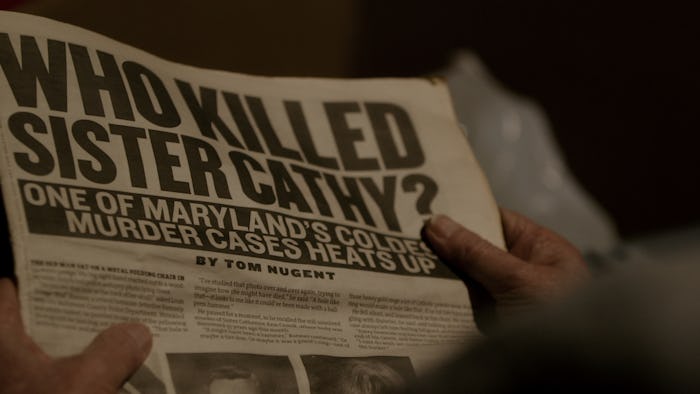Entertainment

Joyce Malecki's Killer Has Been A Mystery For Years
Netflix's latest series The Keepers follows the investigation into the 1969 death of Sister Catherine Cesnik, a young nun in Baltimore. But Cesnik's unsolved murder isn't just an ordinary cold case — those investigating who are featured in the new seven-part docuseries fervently believe that the beloved teacher's death was connected to an alleged sex abuse scandal. But she wasn't the only young woman to disappear (and be killed) around the same time as Sister Cathy though. So who killed Joyce Malecki? Their deaths could end up being connected.
As with Cesnik, Malecki's death from nearly 50 years ago remains a cold case. Officially, no one knows for sure why either woman died in the terribly gruesome manner they did, and no one knows who killed them. But if you ask the people featured in The Keepers — including Teresa Lancaster and Jean Hargadon Wehner (the alleged victims of Keough's then-chaplain Father Joseph Maskell) and Abbie Schaub and Gemma Hoskins, the two former Keough students leading the renewed investigation— they have a theory as to the motive for the killings and even the culprit. It's their contention that Maskell was directly involved in both murders — if not that he killed Malecki and Cesnik himself.
Romper reached out to the Baltimore Archdiocese for a statement regarding the accusations against Father Maskell and his potential involvement in Cesnik's death. The spokesperson commented that "Father Maskell was never considered a suspect in that murder. He was interviewed once. One of the victims claimed that she had a recovered memory of his involvement in her death, but he was interviewed and never charged."
The extensive and numerous allegations against Maskell first came to light in the early 1990s, when Wehner and Lancaster began to uncover their memories of abuse and brought their accusations forward. Wehner and Lancaster sued Maskell and various church officials and figures connected to the abuse in a civil lawsuit (though that case was eventually dismissed, citing the expired statute of limitations). Wehner, then as an anonymous accuser, also told authorities that Maskell had taken her to see Cesnik's dead body — weeks before it was discovered. That was enough for the police to look into the nun's cold case once again (and specifically to look at Maskell as a suspect), though, in the end he was never charged with any crime in connection to any death and denied knowing anything about what happened to her up until his death in 2001.
But how does Malecki's death relate to all this? The 20-year-old was not a Keough student or a definitively known associate of Maskell. Despite the fact that Malecki was abducted from a shopping mall just days after Cesnik disappeared (and was found dead near where Cesnik's own body would be recovered), the Baltimore County Police and FBI (who had jurisdiction over Malecki's crime scene) did not treat the two as connected cases at the time. However, in recent years, that has changed. In 1994, soon after Wehner came forward with her claim about being taken to see Cesnik's body, the Baltimore County Police and FBI forged a liaison to "consider possible connections" between the two deaths.
That ended up going nowhere. But just about 20 years after that, amateur investigators began connecting the dots. According to Inside Baltimore's investigation into the Cesnik case, there are more than a few potential connections between the deaths — and connections between Malecki and Maskell. Malecki's brother stated to Inside Baltimore that the family lived near St. Clement Church, just two blocks from where Maskell lived and assisted for several years at the time of the killings. Additionally, the Malecki siblings (including the victim) attended "week-long retreats" during high school, where they received "religious instruction" from Maskell. However, no evidence was ever found that links him to the crime.
All of this could suggest a possible link between the two young women's deaths. At the very least, it's a good thing The Keepers is shining a light on these long-cold cases. Maybe now, these cases can finally get some answers — and some closure.